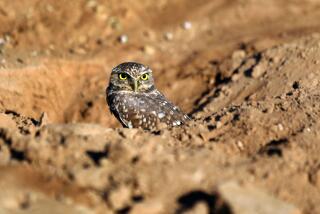Opinion: Sweet! Los Angeles is closer to legalizing beekeeping
- Share via
Los Angeles is getting closer to legalizing backyard beekeeping and the proposed ordinance couldn’t come at a better time.
Professional beekeepers reported this week that 42% of their honeybees died in the last year, and, for the first time, they lost more bees during the summer than the winter. That’s surprising and worrisome because bees typically suffer in the cold weather, but fare better during the warm pollination season. And it underscores fears that parasites, pesticides and farming practices might be weakening the bee population, which is essential for pollinating the nation’s food crops.
Backyard beekeeping can’t replace commercial beekeeping operations, but the urban honeybees may help replenish the diminishing supply, or provide disease-resistant genes that can be introduced in the commercial bee lines. The more healthy bees in the environment, the better for everyone.
Current city law prohibits beekeeping, except on land zoned for agricultural uses. The proposed ordinance, approved Thursday by the city Planning Commission, would allow beekeeping by right in single-family neighborhoods. The resident would need to register as a beekeeper with the Los Angeles County agriculture commissioner, have no more than one hive per 2,500 square feet of lot, keep the hives at least five feet from the neighbors’ yards and 20 feet from the street or sidewalk and keep a source of water for the bees so they don’t seek water from the neighbors’ swimming pool or bird bath. There’s no pre-approval needed, but the city will respond to complaints and if residents break the rules or can’t manage their bees, the city can revoke the right to keep hives.
The City Council still needs to OK the new backyard beekeeping policy before it can take effect, but city leaders have been supportive of urban agriculture. And why not? L.A. has the ideal climate and long growing seasons. The city has hillsides, vacant lots and yards that can support small farms and hobby farmers. A vegetable garden or orchard is a more productive use of our precious water supply than a green lawn. And more fruits and vegetables grown locally mean less produce has to be trucked and shipped over great distance, meaning fresher food and less fossil fuels burned in transport.
For more opinions, follow me @kerrycavan
More to Read
A cure for the common opinion
Get thought-provoking perspectives with our weekly newsletter.
You may occasionally receive promotional content from the Los Angeles Times.











